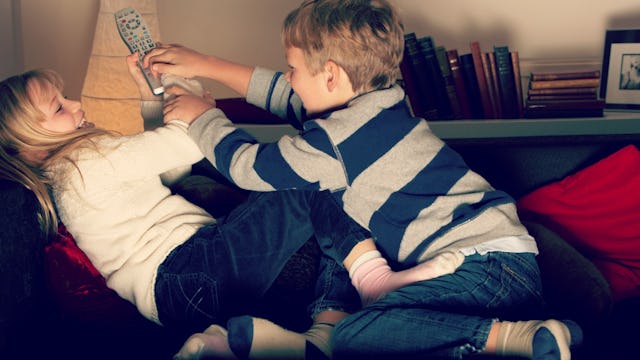My Kids' Fighting Was Driving Me Bonkers. So I Tried This And It Worked.

I always knew I wanted three kids. As a younger sister to one older brother, I yearned for another sibling. I imagined playing house with my younger sister when my brother was “being boring” and reading books, and making up shows with my brother when my sister was whining and crying. I would never want for a playmate, I thought. But all the begging in the world wasn’t enough to convince my parents to go for it.
And now with three kids of my own, I get so much pleasure watching them play together and enjoy each other’s company. And then there are the rest of the moments. The ones in which there is yelling, hitting, poking, tackling, kicking, pinching, insulting, pouting, scratching. Those moments are hard for us all, but maybe most of all for me. When my kids fight, my anxiety level immediately peaks.
Usually the fights have to do with sharing. Sharing a toy, a friend, a cousin, a food. And they do want those things, but below the surface, that’s not really what they are fighting over. They are competing for the love and attention of us parents. They want to know – do you love me the most? Do you think I’m the most special of all your kids? Am I unique and special?
How do I know? Because when I am around, the fights become more intense, escalate to physical fighting more quickly, and last longer than when I am in the other room.
Meanwhile, my internal script is often something like this: Do I defend the youngest? Do I punish them all? Give them a time out? Take the toy? Have them apologize to each other? Tell them to play in different areas?
And I’m conflicted about how much to intervene. As a therapist I have another internal dialogue, equally torn, about their deeper motivations, desires, and needs, and how I can quell their anxiety.
Last year I felt overwhelmed by the amount of fighting that was happening in my home — not only between the boys, but with my 3-year-old girl, as well. I went to a session on parenting with Tovah Klein, the Director of the Barnard College Center for Toddler Development, and the author of “How Toddlers Thrive,” and she suggested something I had also been reading in my own research at the time: “Let the kids fight it out. And if you don’t want to watch, then send them to their room to do it.”
Klein said that when we intervene, we end up pitting the siblings against each other by adding a triangle dynamic. But when we extract ourselves we allow the kids to band together, ideally even against us. I asked her about my three year old: Won’t she get hurt?
“Is she tough?” Tovah asked.
“Definitely,” said.
“Then she can fend for herself.”
I felt confused by this advice, but went home to try it. The first few fights were grueling for me. I realized how much I had been intervening, asking them to apologize to each other, giving them time-outs, confiscating a toy, using timers, etc. I also realized how much energy I had been exerting, often ending up exhausted and upset. Meanwhile the kids would be on to another game within minutes, forgetting the entire episode.
But eventually I managed to change my attitude. When I saw them fighting I would say, “You can fight, but please don’t do it in front of me.”
For a while they were quite shocked. “What do you mean we can fight?” Eventually they would come back saying, “We don’t want to fight!” Sometimes they would go into their room and continue fighting. In those moments, I simply had to wait it out and hope they didn’t kill each other. And sure enough, usually within minutes, they came back out unscathed.
Without me being a crucial player, their fights became a little less interesting to them.
Around this time, I started writing songs about siblings and their experience. Prior to having a third, my songs focused on the relationship between parent and baby, but now I found myself investigating the intricacies of the sibling bond. The dynamics between siblings suddenly seemed just as fundamental to shaping who we become and how we later relate with others in the world as the parent/child relationship. For instance: How do we handle competition with peers? How do we relate to and support friends? How do we handle rejection? These are all practiced with our siblings.
The question I found most intriguing was: What can parents do to help foster a healthy and loving relationship between our kids?
My findings within my own home surprised me. The answer was to back off. But that is not as simple as it seems. Backing off means extracting ourselves not just physically, but emotionally. But if their acute emotional antenna sense that we are truly neutral, they lose interest and back off as well.
I also began to interview grown-up siblings in order to answer some of my questions. My second finding was: make sure each kid feels special. They want to know that they are loved in a way that is unique to them. If they fully feel that, there is less of a need to compete in order to be convinced.
Has the fighting stopped in our home? Hell no. But now I am not a part of it and that means that the fights are much more about the thing itself. And fighting over a lightsaber is a lot less interesting than fighting over love.
This article was originally published on